 Tim
Garland
Tim
Garland
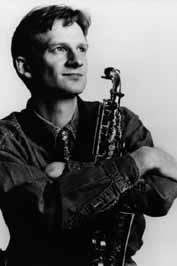 Alto-saxophonist
Matt Wates
Alto-saxophonist
Matt Wates

http://www.myspace.com/mattwatessextet.
![]()
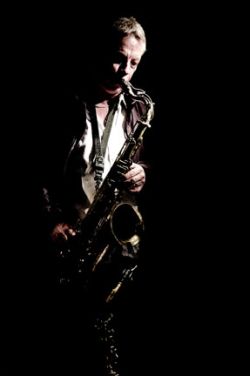 Pat
Crumly
- Saxophones and Flute.
Pat
Crumly
- Saxophones and Flute.
The very experienced
Oxford (UK) -born saxophonist Pat Crumly’s
career has included work with a broad range of artists in both the
jazz and blues/rock field, and along the way he has led his own
groups from Quartet to Sextet to Big Band. His passionate saxophone
and lyrical flute have been featured with Jimmy Witherspoon, Zoot
Money, Eric Burdon, Alan Price, Chris Farlowe, Georgie Fame, Roger
Chapman, Lulu, Maggie Bell, Salena Jones, Tam White, Duffy Jackson,
Joe Newman, etc. and he has worked alongside many British jazz
players including Ronnie Scott and John Dankworth.
Pat
has recorded several albums for Spotlite Records and has a current
release on the 33 label, ‘Weaver of
Dreams’ (33JAZZ086),
with his new Quartet. Pat
co-led the Ronnie
Scott Legacy Band for more than five years after Ronnie’s demise,
touring the UK several times, playing a series of sell-out concerts
in New Zealand and recording a tribute album, ‘Excuse Me Do I Know
You’ (Jazzhouse), now reissued on the Jazzizit label as
‘Ronnie Remembered’
(JITCD0535).
Patrick John Crumly, saxophonist and bandleader: born Oxford 9 February 1942; twice married (two sons); died Tropea, Italy 29 September 2008.
 Bobby
Wellins Bobby's recording
career started in 1956 when he joined the legendary Buddy
Featherstonhaugh's piano-less quintet the line-up of which featured
Kenny Wheeler on trumpet. Bobby was by now playing tenor saxophone,
the instrument to which he has devoted himself to the present day.
In the early 1960's Bobby was recruited by Tony Crombie for his
latest band, in the ranks of which Bobby began a long association
with the great British pianist Stan Tracey. Along with Bobby and
Stan, drummer Laurie Morgan was a member of a loose co-operative of
musicians and poets, including Michael Horowitz, who presented jazz
and poetry concerts under the title of New Departures. In a bedsit
with Laurie Morgan and using an old tape recorder, Bobby began work
on his famous Culloden Moor Suite which culminated in its
performance by the New Departures Quartet and a 14 piece orchestra.
That quartet recorded analbum of the same name in 1964. This was
followed in 1965 by the Stan Tracey Quartet's recording of an suite
of pieces inspired by Dylan Thomas'
Under Milk Wood. In a 1998 poll by Jazz UK magazine, readers
chose this record as their all-time favourite British jazz album. It
is testament to the musical creativity of Bobby and Stan and the
strength of the latter's compositions that despite the thousands of
records made in the intervening 33 years, this record was chosen.
Bobby
Wellins Bobby's recording
career started in 1956 when he joined the legendary Buddy
Featherstonhaugh's piano-less quintet the line-up of which featured
Kenny Wheeler on trumpet. Bobby was by now playing tenor saxophone,
the instrument to which he has devoted himself to the present day.
In the early 1960's Bobby was recruited by Tony Crombie for his
latest band, in the ranks of which Bobby began a long association
with the great British pianist Stan Tracey. Along with Bobby and
Stan, drummer Laurie Morgan was a member of a loose co-operative of
musicians and poets, including Michael Horowitz, who presented jazz
and poetry concerts under the title of New Departures. In a bedsit
with Laurie Morgan and using an old tape recorder, Bobby began work
on his famous Culloden Moor Suite which culminated in its
performance by the New Departures Quartet and a 14 piece orchestra.
That quartet recorded analbum of the same name in 1964. This was
followed in 1965 by the Stan Tracey Quartet's recording of an suite
of pieces inspired by Dylan Thomas'
Under Milk Wood. In a 1998 poll by Jazz UK magazine, readers
chose this record as their all-time favourite British jazz album. It
is testament to the musical creativity of Bobby and Stan and the
strength of the latter's compositions that despite the thousands of
records made in the intervening 33 years, this record was chosen.
 Duncan
Lamont Born in Greenock, Scotland. Played
trumpet with Kenny Graham's Afro Cubists changed to tenor sax became
a jazz studio player. Played with almost everyone in show business.
He has worked (often as a featured soloist) with Henry Mancini,
Robert Farnon, Benny Goodman, Gil Evans, Bill Holman, Nelson Riddle,
Peggy Lee, Frank Sinatra, Tony Bennett, Bing Crosby, Count Basie,
Fred Astaire, Benny Carter, Mel Torme, Paul McCartney�the list is
endless.
Duncan
Lamont Born in Greenock, Scotland. Played
trumpet with Kenny Graham's Afro Cubists changed to tenor sax became
a jazz studio player. Played with almost everyone in show business.
He has worked (often as a featured soloist) with Henry Mancini,
Robert Farnon, Benny Goodman, Gil Evans, Bill Holman, Nelson Riddle,
Peggy Lee, Frank Sinatra, Tony Bennett, Bing Crosby, Count Basie,
Fred Astaire, Benny Carter, Mel Torme, Paul McCartney�the list is
endless.
Orchestral Suites - The Young Person's Guide to the Jazz Orchestra,
The Carnival of the Animals, Soho Suite (commissioned for The Soho
Festival), Sherlock Holmes Suite commissioned for the festival of
London with Sir Spike Milligan, Cinderella, Carmen, Buddy Rich Suite
and many others. His most recent being Porgy and Bess with an
all-star orchestra. Duncan has arranged and conducted for the B.B.C.
for many years and has recorded as a soloist and an arranger with
the Metropole Orchestra. His suite Beautiful Ireland for the Ulster
Youth Jazz Orchestra was performed at the Londonderry Jazz Festival.
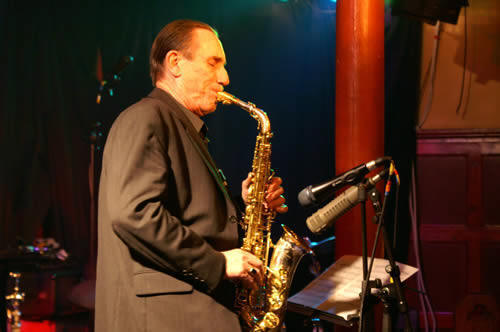 PeteR
King
PeteR
King
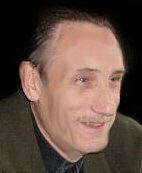 Although
he now concentrates on his work as a solo artist and with his regular
Quartet, Peter has worked and with such legends as Bud Powell, Elvin
Jones, Max Roach, Milt Jackson, Lalo Schifrin, Frank Foster's ‘new'
Count Basie Band and the Ray Charles Orchestra. He has also recorded
with Hampton Hawes, Al Haig, Philly Joe Jones, Zoot Sims, Al Cohn, and
many others, including Red Rodney, who said this of Peter.. “He's
got that natural growl in his playing –yet he's soft and beautiful when
he wants to be.” Peter has also worked with many great singers,
such as Ernestine Anderson, Joe Williams, Anita O'Day, and made albums
with Jon Hendricks and Jimmy Witherspoon. He has also accompanied
artists as diverse as Tony Bennett, Marlene Dietrich, James Brown and
Lauren Bacall. King is also known for his recorded work with the pop
group, 'Everything but the Girl' and as featured soloist and Musical
Director of the Charlie Watts Quintet. Peter can also be seen in films
such as ‘Blue Ice' starring Michael Caine and the new hit movie, ‘The
Talented Mr. Ripley', staring Mat Damon and directed by the Oscar
winning Anthony Minghella. Peter also can also be heard playing on Mike
Figgis' film ‘Time Code' particularly over the opening titles. A
prolific composer and arranger, his most ambitious work to date is
probably "Janus", a BBC commission, featuring his own Quartet and the
"Lyric String Quartet". He has many albums to his name, including
‘Tamburello' (which won the Best CD of the Year prize at the ‘BT British
Jazz Awards'. The latest CD's, “Lush Life” and ‘Footprints', are now
available on the same Miles Music label. Peter's latest project is a
full length two act Opera, ‘Zyklon'. He received much encouragement and
support in this from Sir Peter Hall and Julian Barry, who has written
the libretto. (A shortened version is to be performed at the City
University of New York on 13 Dec 2004).
Although
he now concentrates on his work as a solo artist and with his regular
Quartet, Peter has worked and with such legends as Bud Powell, Elvin
Jones, Max Roach, Milt Jackson, Lalo Schifrin, Frank Foster's ‘new'
Count Basie Band and the Ray Charles Orchestra. He has also recorded
with Hampton Hawes, Al Haig, Philly Joe Jones, Zoot Sims, Al Cohn, and
many others, including Red Rodney, who said this of Peter.. “He's
got that natural growl in his playing –yet he's soft and beautiful when
he wants to be.” Peter has also worked with many great singers,
such as Ernestine Anderson, Joe Williams, Anita O'Day, and made albums
with Jon Hendricks and Jimmy Witherspoon. He has also accompanied
artists as diverse as Tony Bennett, Marlene Dietrich, James Brown and
Lauren Bacall. King is also known for his recorded work with the pop
group, 'Everything but the Girl' and as featured soloist and Musical
Director of the Charlie Watts Quintet. Peter can also be seen in films
such as ‘Blue Ice' starring Michael Caine and the new hit movie, ‘The
Talented Mr. Ripley', staring Mat Damon and directed by the Oscar
winning Anthony Minghella. Peter also can also be heard playing on Mike
Figgis' film ‘Time Code' particularly over the opening titles. A
prolific composer and arranger, his most ambitious work to date is
probably "Janus", a BBC commission, featuring his own Quartet and the
"Lyric String Quartet". He has many albums to his name, including
‘Tamburello' (which won the Best CD of the Year prize at the ‘BT British
Jazz Awards'. The latest CD's, “Lush Life” and ‘Footprints', are now
available on the same Miles Music label. Peter's latest project is a
full length two act Opera, ‘Zyklon'. He received much encouragement and
support in this from Sir Peter Hall and Julian Barry, who has written
the libretto. (A shortened version is to be performed at the City
University of New York on 13 Dec 2004).
In the Autumn of 2001 Peter went on the road
again with the new Charlie Watts Tentette, for which he wrote several
arrangements. As well as playing two weeks at Ronnie Scott's, the band
played at the Blue Note in Tokyo and New York. In October 2002 Peter
visited Russia for an extensive and highly successful solo tour. This
was followed by a return trip in Aug 2003 when his Quartet played at the
Moscow Summer Festival, where Peter was presented with a special
LifeTime Achievement award.
Peter has composed a full length two act opera, "Zyklon", with the libretto by Julian Barry. A short workshop version was performed at the City University of New York on 13 Dec 2004 and received a standing ovation.
Peter is currently working on his autobiography, which is projected for publication sometime in 2007 and also a new Jazz Mass, to be premiered at Newcastle Cathedral.
Gene
Lees
"I
hear both Trane and Bird in his playing, but he is better than either of
them."
Elvin Jones
”A wonderful musician, Peter
King, of course, is a master of his instrument. People are aware of that
here in America as well as in England”
Lalo Schifrin
"Peter King is one of the best
musicians in the world." . . . who travels very comfortably in the
language of jazz and at the same time, classical music. . . . . . . . .
“I feel very lucky to have met and to have worked with (him)”.
. . . . . .”Congratulations (on your opera) ‘Zyklon’. “I was very
impressed with your avant-garde writing techniques, and at the same
time, your sense of drama”.
George Coleman
“ ...a great musician”
Nat Adderley
-“..World’s great Altoist, My
man!”
“plays with...searing authority” Guardian;
Peter King plays Charlie Parker's Grafton Sax at Christies
 Mornington
Lockett
Mornington
LockettMornington Lockett studied at Dartington College Of Arts in Devon before moving to London to attend the Guildhall School of Music and Drama. As a member of the Ronnie Scott Sextet, Mornington worked extensively in Britain and abroad. He has recorded albums with Ronnie Scott, guitarist Jim Mullen, drummer Martin Drew, pianist Stan Tracey, and jazz singers Sarah Jane Morris, Claire Martin, and Ian Shaw. In 1995 he performed at the Barbican with Cuban trumpet supremo Arturo Sandoval. Mornington has also toured internationally with Oscar Peterson's long time sidemen, drummer Martin Drew and bassist Niels Henning Ørsted Pedersen, and toured Europe in the summer of 2004 with the legendary hammond organist Jimmy Smith.
Mornington has worked in a number of different combinations with Stan and Clark Tracey, including the memorable 'Continental Drift' Band formed to celebrate Stan's 75th birthday, and the 'Ellingtonia' sextet. Other Stan Tracey collaborations include the 'Under Milk Wood Suite', and Big Band concerts celebrating the centenary of the birth of Duke Ellington and Ellington's
 Alan
Barnes
Alan
Barnes
Alan is one of Britain’s most
renowned and well-loved saxophonists. He has played in bands
with a wide range of jazz styles including The Pasadena Roof
Orchestra, Humphrey Littleton, The Charlie Watts Tentet and
the Pizza Express Modern Jazz Sextet. He has toured the USA
and Europe with the Bryan Ferry Band and appeared on
sessions with Selina Jones, Bjork and Van Morrison. He
co-leads his own bands with Dave Newton and Bruce Adams.
Alan is a fellow of Leeds College of Music where he was
Artist in Residence in 2004. He is an experienced teacher,
having taught on the Leeds & Middlesex Jazz Courses and on
different summer schools.
 Frank Griffith Biography -
born in Eugene, Oregon in 1959,
Frank Griffith Biography -
born in Eugene, Oregon in 1959,
Frank lived in New York
City from 1980-1995. While there he worked with Ron Carter, Jon
Hendricks and Jack McDuff and played lead alto with the Glenn
Miller Orchestra for a nationwide tour in 1984. He has also
worked with the orchestras of Toshiko Akiyoshi, Mel Lewis, Buddy
Rich and Mel Torme. He has recorded with guitarist/singer John
Pizzarelli on his CD’s “All Of Me” and “Naturally” and produced
and arranged for guitarist Dave Stryker’s CD “Nomad”.
As a composer/arranger Frank
has contributed music to the Ron Carter Nonet, the Lionel Hampton Orchestra, the
Jon Hendricks Explosion, the Blue Wisp Big Band and the Brooklyn Philharmonic
Orchestra. Frank received his Masters Degree from Manhattan School of
Music, and a BFA from City College of New York, where he also taught from
1985-1995. Moving to London in 1996,
Frank has arranged for Mark Nightingale, Tony Coe, Norma Winstone and Joe
Temperley. He also plays and writes for the Pete Cater Big Band, whose CDs,
“Playing With Fire” (1997 Jazzizit) “Upswing” (2000 Vocalion) and “The Right
Time” (2006 Vocalion) feature many of his compositions and arrangements. His
band, The Frank Griffith Nonet performs frequently in the London area including
annually at the Ealing Jazz Festival since 2000. Their first appearance there
resulted in the “Frank Griffith Nonet ‘Live’Ealing Jazz Festival 2000” CD on
HEPJAZZ. Their cd “The Coventry Suite” was released in 2004 on 33 Records.
His debut CD “The Suspect” featuring Tom Harrell on HEPJAZZ in 1999 is
also currently available internationally. His clarinet and arrangements for
baritone saxophonist Joe Temperley were featured on Joe's 2001 CD "Easy To
Remember" also on HEPJAZZ. Frank has received commissions from the Ealing
and Coventry Jazz Festivals, the Cardinal Vaughan Memorial School Big Band, the
Oakham School Big Band and the Midlands Youth Jazz Orchestra.
Currently Frank is a lecturer in music at Brunel University, and teaches
annually at the Jamey Aebersold Summer Jazz Workshops. He is a member of the
Jazz Services Education Panel and has two compositions published in the
Associated Boards Jazz Works ensemble series. He is also a
consultant for the Associated Boards Jazz Clarinet Syllabus and has composed two
pieces for their Jazz Saxophone Syllabus. He is currently writing a jazz
saxophone tutor book for Schott Publications. A longstanding member of the
International Association of Jazz Educators, Frank serves on their Resource Team
and advises on Post Secondary Education.
Frank’s work chronicling the music and career of Sir John Dankworth was
published in his article Jazz in British New Wave Cinema- an interview with
Sir John Dankworth in the December 2006 issue of The Journal Of
British Cinema and Television. He also appears on the John Dankworth Big Band
featuring Cleo Laine 2007 CD “The Blues Ain’t”.
 Art
Themen (b. 1939) is a
Saxophonist (and
orthopaedic
surgeon).
Art
Themen (b. 1939) is a
Saxophonist (and
orthopaedic
surgeon).
Themen was born on 26 November
1939
in
Manchester. In
1958
he began his medical studies at the
University of Cambridge, going on in
1961
to complete his studies at
St Mary's Hospital Medical School in
London, qualifying in
1964.
He specialised in orthopaedic medicine, eventually becoming a
consultant. Themen started playing jazz with the Cambridge
University Jazz Group, and then in London playing with
blues
musicians
Jack Bruce and
Alexis Korner. In 1965 he played with the
Peter Stuyvesant Jazz Orchestra in
Zürich, going on to play with such English luminaries as
Michael Garrick and
Graham Collier's Music. In 1974 he entered on what was
to be one of his central musical relationships when he started
playing with
Stan Tracey. He has played with all of Tracey's groups,
touring with him all over the world as well as around the UK. He
has also played and toured with musicians such as
Nat Adderley,
Ian Carr,
George Coleman, and
Al Haig. His style originally owed much to the
influence of
Dexter Gordon and
Sonny Rollins, but later influences included such disparate
saxophonists as
Coleman Hawkins,
Evan Parker, and the “sheets of sound”
John Coltrane.
 Ben Castle - tenor and soprano
saxophones, bass clarinet
Ben Castle - tenor and soprano
saxophones, bass clarinet
Ben started his playing early achieving distinction on clarinet at
the age of thirteen . Encouraged by his father , the musician and
entertainer Roy Castle , Ben was soon playing in many bands and
after leaving school he studied at the Guildhall School of Music .
Now Ben's freelance playing covers a very broad spectrum from
orchestras , big bands , pop and rock groups to the jazz scene . He
has performed and recorded with many people including Stan Tracey ,
Alan Barnes , Don Weller , Matt Wates , Clark Tracey , Mark
Nightingale , Humphrey Lyttleton , Laurence Cottle , Bobby Worth ,
Michael Garrick plus Echoes of Ellington and the BBC Big Band . Ben
leads and writes for his own group and 2000 saw the release of their
first recording " Four From The Madding Crowd " . He was voted
rising star in the British Jazz Awards 2001, and was nominated for a
BBC jazz award. He has lead his quartet at Ronnie Scotts and you can
catch up on Ben's schedule at his web-site.
Ben Castle is one of Britain's most respected tenor players who has played, written or arranged for Carleen Anderson, Jamie Cullum, Sting, Marillion, Kula Shaker, Stan Tracey, Lalo Schifrin, Moloko, Culture Club, Andy Williams, Quincy Jones, Jools Holland & Kyle Eastwood. 'The Heckler' from his own album 'Blah Street' won the International Song Writing Competition, judged by Pat Metheny.
 Ben
Waghorn As a musician Ben
has been involved in some varied things over the years - but
highlights include working alongside musicians such as Keith Tippett,
John Etheridge, Steve Waterman, Damon Brown, Andy Sheppard, Sirius
B, Alan Barnes, Andy Hague, Jim Blomfield, Jeff Spencer, Jerry
Crozier Cole, Morningstar, Invisible pair of Hands and Hammond
Organist John Paul Gard. I have also played and/or recorded with
bands Portishead, Goldfrapp and Ilya. I recently worked for composer
Richard G Mitchell playing clarinet on the soundtrack for the film
'A Good Woman'.
Ben
Waghorn As a musician Ben
has been involved in some varied things over the years - but
highlights include working alongside musicians such as Keith Tippett,
John Etheridge, Steve Waterman, Damon Brown, Andy Sheppard, Sirius
B, Alan Barnes, Andy Hague, Jim Blomfield, Jeff Spencer, Jerry
Crozier Cole, Morningstar, Invisible pair of Hands and Hammond
Organist John Paul Gard. I have also played and/or recorded with
bands Portishead, Goldfrapp and Ilya. I recently worked for composer
Richard G Mitchell playing clarinet on the soundtrack for the film
'A Good Woman'.
His Quartet plays Jazz Venues and Festivals all over the country.
Currently it features pianist Jim Blomfield, bassist Riaan Vosloo
and drummer Andy Hague. Ben plays saxes, bass clarinet and flute,
and the material that we play is a mixture of original tunes and
standards.
Peter Cook
Alto
Saxophone, Clarinet
Active on the London jazz scene since
1992, Peter plays saxophone in a variety of ensembles including his
own Peter Cook Septet. He completed the post-graduate course in jazz
studies at Guildhall School of Music & Drama in 1994 and obtained an
LGSM in jazz studies. Since then he has performed at many jazz
festivals in the UK, mainland Europe and Scandinavia as a member of
Ray Gelato’s Giants and Blue Harlem. A respected composer and
arranger, Peter has written for The Guildhall Jazz Band, Ray Gelato
Giants, his own Septet, Blue Harlem, Seymour's Jump, and for
vocalists Louise Cookman and Joan Viskant. From 1995 he lectured in
performance at Brunel University until his appointment as Head of
Jazz at the London College of Music and Media at Thames Valley
University in 2003. He is Saxophone Tutor at Wellington College,
Crowthorne, Berkshire. Peter joined the faculty of the Jamey
Aebersold Jazz Summer School in 2004.
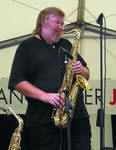 Rod
Mason is
a Midland lad who moved North to study the Saxophone at the now Huddersfield
University. He started playing the saxophone aged 12 during his 2nd year at
secondary school. Whilst at school he became involved with the local Big Band
and discovered the joys of swing and jazz. He played in many local youth jazz
orchestras as well as playing with the M.U. Big Band. Upon moving to
Huddersfield he began playing with many Northern bands and also started to form
his own small groups. One of the big turning points for Rod was one Friday night
watching The Old Grey Whistle Test, when he first discovered the Billy Cobham
band which at that time included the Brecker brothers and John Abercrombie).
This was to change his musical outlook on life.
Whilst at college he
gained his degree in Music studying all the great classical composers but also
did talks for the college on jazz music and for his final assignment wrote about
jazz music. At University he formed with others the Northern Jazz
Orchestra which played throughout the North at festivals and other venues, Rod
was the M.D. for 2 years. He also had a small band playing has original
compositions.
Rod
Mason is
a Midland lad who moved North to study the Saxophone at the now Huddersfield
University. He started playing the saxophone aged 12 during his 2nd year at
secondary school. Whilst at school he became involved with the local Big Band
and discovered the joys of swing and jazz. He played in many local youth jazz
orchestras as well as playing with the M.U. Big Band. Upon moving to
Huddersfield he began playing with many Northern bands and also started to form
his own small groups. One of the big turning points for Rod was one Friday night
watching The Old Grey Whistle Test, when he first discovered the Billy Cobham
band which at that time included the Brecker brothers and John Abercrombie).
This was to change his musical outlook on life.
Whilst at college he
gained his degree in Music studying all the great classical composers but also
did talks for the college on jazz music and for his final assignment wrote about
jazz music. At University he formed with others the Northern Jazz
Orchestra which played throughout the North at festivals and other venues, Rod
was the M.D. for 2 years. He also had a small band playing has original
compositions.
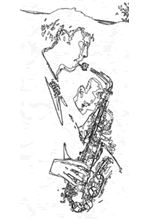 Brass
Jaw
Brass
Jaw
Featuring
:-
Paul Towndrow - Alto
Martin Kershaw - Alto
Brian Molley - Tenor
Allon Beauvoisin - Baritone
The Brass Jaw Saxophone Quartet are a young group, part of the vibrant Scottish
jazz scene.
This critically acclaimed
group brings together the talents of some of the most creative
saxophonists in the UK, embracing a vast variety of styles within their
own compositions and arrangements, taking the format in a new direction,
distinct from that of their predecessors, The 29th Street Saxophone
Quartet from USA and the UK's Itchy Fingers. After their hugely
successful National tour of the United Kingdom in 2005 which also saw
them perform live on BBC Radio Scotland, Brass Jaw released their début
album “BURN” in June 2006. “They riff and hustle with the groovy
pep of James Brown's horn section or lay out lush voicings that sound
more like an orchestra than a quartet. They mix solo features of
considerable virtuosity with keen ensemble understanding and they slip
into The Police's Walking on the Moon and Spanish-Cuban fantasies with
the same ease and aplomb as they do jazz standards.
Above all, they
communicate a feeling of enjoyment alongside the passion, a good time
that travels freely from stage to audience.”
Rob Adams The Herald
"Altogether, an accomplished and ambitious ensemble who aren't afraid to
enjoy themselves."
James Griffiths The Guardian
Ian Ellis is a London based saxophonist active in contemporary jazz as well as rock, pop and funk. The Ian Ellis Quartet plays a mixture of Ellis originals and re-invented standards and has performed at venues across the UK. Apart from his own projects Ellis has played, toured, recorded with Ruby Turner, Arturo Sandoval and Guy Barker and is a busy freelance session musician and teacher. Steve Rose studied Performing Arts at Middlesex University and now plays double bass, piano and keyboards. He’s worked with jazz and pop stars such as Jacqui Dankworth, Iain Ballamy, Mark Mondesir, and Paul Weller. He has worked extensively in international theatre and contemporary dance, composing and performing music for leading companies including the London Contemporary Dance Theatre, Amici, the David Glass Ensemble and Candoco. Recently he was musical director at the Royal Opera House, Covent Garden, working with members of the orchestra and young people with autism. He also works as a film and TV composer.
 Paul Booth
Tenor Saxophonist Paul Booth is very much a rising star at
the age of 27, but his career to date is, if anything, more remarkable. Paul has
been playing from the age of ten and started to play extensively on the North
East jazz scene at the age of l3. The Royal Academy of Music accepted Paul at
the age of 15 onto their four-year degree course in jazz from which Paul
graduated with honours.
Winner of “The Most Promising Jazz Player of the
Year Under 21”, judged by John Dankworth and Chris Barber in the televised
“Young Jazz Player of the Year” competition when only 16. The following year he
was voted “The Best Modern Jazz Player” in the same competition judged by Kenny
Ball and Ronnie Scott, who likened his mature impact to that of the young Tubby
Hayes decades earlier.
Paul Booth
Tenor Saxophonist Paul Booth is very much a rising star at
the age of 27, but his career to date is, if anything, more remarkable. Paul has
been playing from the age of ten and started to play extensively on the North
East jazz scene at the age of l3. The Royal Academy of Music accepted Paul at
the age of 15 onto their four-year degree course in jazz from which Paul
graduated with honours.
Winner of “The Most Promising Jazz Player of the
Year Under 21”, judged by John Dankworth and Chris Barber in the televised
“Young Jazz Player of the Year” competition when only 16. The following year he
was voted “The Best Modern Jazz Player” in the same competition judged by Kenny
Ball and Ronnie Scott, who likened his mature impact to that of the young Tubby
Hayes decades earlier.
 Chris
Biscoe Born 1947
Barnet, Hertfordshire, UK, Started on alto sax in 1963, Added tenor sax in 1965,
soprano in 1967, baritone in 1973,Started on flute around 1973, Started alto
clarinet in 1975, Self-taught on all these instruments
Chris
Biscoe Born 1947
Barnet, Hertfordshire, UK, Started on alto sax in 1963, Added tenor sax in 1965,
soprano in 1967, baritone in 1973,Started on flute around 1973, Started alto
clarinet in 1975, Self-taught on all these instruments
Studied English at Sussex University 1965-1968 and played with various
contemporaries including percussionist Roger Turner, First recording with
pianist/singerBen Sidran 1969/70. Worked as computer programmer
1969-73 then turned to music full-time.
Between 1971 and 1979 played, recorded and broadcast with Pete Hurt,
Tommy Chase, Pete Saberton, Barry Guy, Dave Holdsworth, Pete Jacobsen, Redbrass.
1979 joined Mike Westbrook with whom he has toured throughout Europe
and played at international festivals in Australia, Singapore, Hong Kong, Canada
and the USA. and made many records. 1979-1995 Chris Biscoe Quartet
featuring Peter Jacobsen - expanded to Quintet in 1980, Sextet in 1986,
reformed as Quartet 1987.
 Stan
Sulzmann is without
question one of the most highly respected musicians in the UK today, admired by
musicians and audiences for his instantly recognisable sound, and boundless
creative imagination, and is a source of inspiration to many of Britain's
emerging young musicians.
Sulzmann’s career stretches back to the 60’s, when as part of a uniquely
talented crop of British musicians, he played with Graham Collier, John Taylor,
Kenny Wheeler, Gordon Beck, as well as leading many groups of his own.
Since that time Stan has
been at the forefront of European contemporary jazz, and his talents have been
sought by a host of discerning musicians, including Gil Evans, Mike Gibbs, Kenny
Clarke/Francy Boland and Michael Brecker. Constantly in demand as a guest
soloist, he has appeared with bands across Europe, including the Hilversum Radio
Orchestra, NDR Big Band (alongside Chet Baker), Hanover Radio Symphony Orchestra
and the New York Composers Orchestra. Further intimate and refreshingly
innovative musical partnerships have developed with acclaimed British pianist
Nikki Iles, American keyboard player Marc Copland
and the trio Ordesa - a drumless, bassless combination with Kenny Wheeler and
John Parricellli.‘possibly the strongest new band in the country’ Independent August 2002 An accomplished and
distinguished composer, Stan's writing talents are internationally recognised,
and have most recently found expression in writing for Ordesa, and the Stan
Sulzmann Big Band. His music has been described in glowing terms 'ravishing,
delicious, powerful and direct…
Stan
Sulzmann is without
question one of the most highly respected musicians in the UK today, admired by
musicians and audiences for his instantly recognisable sound, and boundless
creative imagination, and is a source of inspiration to many of Britain's
emerging young musicians.
Sulzmann’s career stretches back to the 60’s, when as part of a uniquely
talented crop of British musicians, he played with Graham Collier, John Taylor,
Kenny Wheeler, Gordon Beck, as well as leading many groups of his own.
Since that time Stan has
been at the forefront of European contemporary jazz, and his talents have been
sought by a host of discerning musicians, including Gil Evans, Mike Gibbs, Kenny
Clarke/Francy Boland and Michael Brecker. Constantly in demand as a guest
soloist, he has appeared with bands across Europe, including the Hilversum Radio
Orchestra, NDR Big Band (alongside Chet Baker), Hanover Radio Symphony Orchestra
and the New York Composers Orchestra. Further intimate and refreshingly
innovative musical partnerships have developed with acclaimed British pianist
Nikki Iles, American keyboard player Marc Copland
and the trio Ordesa - a drumless, bassless combination with Kenny Wheeler and
John Parricellli.‘possibly the strongest new band in the country’ Independent August 2002 An accomplished and
distinguished composer, Stan's writing talents are internationally recognised,
and have most recently found expression in writing for Ordesa, and the Stan
Sulzmann Big Band. His music has been described in glowing terms 'ravishing,
delicious, powerful and direct…
meticulously written, sometimes echoing the
imaginative and much missed orchestra of Michael Gibbs' The Guardian
'Sulzmann - the classy
composer'. John Fordham
 Tommaso
Starace was born in
Milan in 1975 from an Italian father and Australian mother. He started playing
the alto saxophone at the age of 18. In 1994 he took part in a weekly jazz
seminar organised by Berklee College of Music, taking place in Perugia as part
of the ‘Umbria Jazz Festival’ and in that same year he was accepted at the
Birmingham Conservatoire where he graduated with a BMus first class honours
degree. During those 4 years of college he studied with saxophonists Andrew
Tweed, Chris Gumbley and Nigel Wood both classical and jazz repertoire. In the
summer of 1996 he took part in the Jamey Aebersold Summer Camp in Kentuky and
had the chance of performing and studying with saxophonist Don Braden and Jazz
Educators David Baker. Between the years 1999/2000 he completed the
Postgraduate Jazz course at the Guildhall School of Music and Drama, London.
While attending the course he studied with ex-Jazz Messengers saxophonist Jean
Toussaint, and saxophonists Stan Sulzman and Martin Hathaway; he performed in
small combos and big bands with Billy Cobham, David Liebman, Kenny Wheeler and
Norma Winstone. He also took part in several master classes some of which with
renown jazz musicians such as saxophonist Tim Garland and bass virtuoso John
Patitucci.
Tommaso
Starace was born in
Milan in 1975 from an Italian father and Australian mother. He started playing
the alto saxophone at the age of 18. In 1994 he took part in a weekly jazz
seminar organised by Berklee College of Music, taking place in Perugia as part
of the ‘Umbria Jazz Festival’ and in that same year he was accepted at the
Birmingham Conservatoire where he graduated with a BMus first class honours
degree. During those 4 years of college he studied with saxophonists Andrew
Tweed, Chris Gumbley and Nigel Wood both classical and jazz repertoire. In the
summer of 1996 he took part in the Jamey Aebersold Summer Camp in Kentuky and
had the chance of performing and studying with saxophonist Don Braden and Jazz
Educators David Baker. Between the years 1999/2000 he completed the
Postgraduate Jazz course at the Guildhall School of Music and Drama, London.
While attending the course he studied with ex-Jazz Messengers saxophonist Jean
Toussaint, and saxophonists Stan Sulzman and Martin Hathaway; he performed in
small combos and big bands with Billy Cobham, David Liebman, Kenny Wheeler and
Norma Winstone. He also took part in several master classes some of which with
renown jazz musicians such as saxophonist Tim Garland and bass virtuoso John
Patitucci.
Across the years, since successfully completing his Postgraduate course, Tommaso
has gained a considerable reputation in the Uk jazz scene appearing at many jazz
clubs and Festivals in the country as a sideman and leader. Some of the venues
include : The ‘Vortex’ Jazz Club, The 100 Club, ‘Pizza on the Park’, Royal
Festival Hall Foyer, Boxford Fleece Jazz Club, Plymouth Jazz Club, Bonington
Theatre, Jazz in the Streets Festival ( concert in Trafalgar Square), Bexley
Heath Jazz Club, National Theatre, Jazz at The Green Man, Derenham Jazz Club,
Quay arts Centre,
Milestone Jazz Club, Matt and Phreds Jazz Club, Gumbles Jazz
Club, National Portrait Gallery, Capital Gardens Jazz Festival, Chelsea
Festival, Windsor Festival. He has performed with some of the most
respected uk jazz musicians including: Jim Mullen, Roger Beaujolais, Phil Lee,
Liam Noble, Jonathan Gee, Dave Cliff, Tim Richards, Roland Perrin, Andy Hamill,
Steve Brown, Mike Gorman, Colin Oxley.
 Ed
Jones
began playing saxophone at the age of 15. In 1984 he graduated from Middlesex
University with a degree in music, and for a while served an apprenticeship as a
street musician. After giging for a few years on the London scene he formed his
first group "Ed Jones Quartet" in 1987, recording "The Homecoming" (Acid
Jazz, 1989). In 1991 he formed a new quartet featuring pianist Jonathan Gee,and
drummer Brian Abrahams This band recorded "Pipers Tales" (ASC, 1995).
Since 1995 his main ongoing 'solo' project has been a quintet with which he has
recorded ''Out Here" (ASC, 1997), and "Seven Moments" (ASC 2002).
He has made musical connections in many countries particularly in Japan where he
runs two projects; EJQ (a jazz quartet), and Quasimodo, an
electric project featuring the legendary Paul Jackson on bass.
Ed
Jones
began playing saxophone at the age of 15. In 1984 he graduated from Middlesex
University with a degree in music, and for a while served an apprenticeship as a
street musician. After giging for a few years on the London scene he formed his
first group "Ed Jones Quartet" in 1987, recording "The Homecoming" (Acid
Jazz, 1989). In 1991 he formed a new quartet featuring pianist Jonathan Gee,and
drummer Brian Abrahams This band recorded "Pipers Tales" (ASC, 1995).
Since 1995 his main ongoing 'solo' project has been a quintet with which he has
recorded ''Out Here" (ASC, 1997), and "Seven Moments" (ASC 2002).
He has made musical connections in many countries particularly in Japan where he
runs two projects; EJQ (a jazz quartet), and Quasimodo, an
electric project featuring the legendary Paul Jackson on bass.
In Scandinavia he has been collaborating for many years with Finnish
trumpeter/composer Mika Myllari on a number of projects including the 10 piece
ensemble BURN, and the evolving studio project SILK.
His experience as a sideman reflects his diverse interests. Over the past decade
he has performed with U.S jazz musicians George Benson, Dianne Reeves, Charles
Earland, Horace Silver, Jimmy Witherspoon, Clifford Jarvis and Dr Lonnie Smith
and Melba Joyce. In the UK he has appeared with Dick Heckstall-Smith, John
Stevens, District Six, Evan Parker, Jason Rebello, Claire Martin, Don Weller,
Gary Crosby, Byron Wallen,Tim Richard's Great Spirit, Antonio Forcione, Damon
Brown Quintet, Vibraphonic, Monk Liberation Front, Accension Jazz Orchestra,
Stekpanna and On the Corner.
As a session musician he has worked with Chaka Khan, D'angelo, Herbie Hancock (Headhunters),Omar,
Aswad, Tina Turner, Alison Moyet, Philip Bailey, Bootsy Collins, Mori Kante,
Maysa, Terry Callier, and long standing connections to jazz crossover projects
such as US3 (1992-) and Incognito (1995-) both with whom he has been a regular
band member.
He has also written numerous compositions for film and television, dance and
theatre.
 Simon
Allen studied
saxophone at the Royal Academy, after beginning his
career with the National Youth Jazz Orchestra and
the Pendulum Jazz Orchestra, performing alongside
the likes of Jazz Stars Art Themen, Gerard Presencer
and Peter King.
Simon
Allen studied
saxophone at the Royal Academy, after beginning his
career with the National Youth Jazz Orchestra and
the Pendulum Jazz Orchestra, performing alongside
the likes of Jazz Stars Art Themen, Gerard Presencer
and Peter King.He has worked with Colin Towns’ Mask Orchestra, for the Birmingham Royal Ballet, the Matthew Herbert Big Band and the BBC Big Band, touring around Germany, China, Belgium and Poland.
Simon has appeared at major UK venues and festivals and worked with an astonishing array of top musicians including Kenny Wheeler, Iain Ballamy, Django Bates, John Paracelli, Steve Waterman, Alan Barnes, Don Weller, Ben Castle and Tina May.
Kelvin is a freelance saxophonist, flautist, clarinettist, percussionist and composer who has been leading music ensembles for the past fifteen years.
A graduate from the Leeds College of Music he has played and works with artists such as Bernard ‘Pretty’ Purdie - the world’s most recorded drummer (Aretha, James Brown, Steely Dan etc.). Pucho & the Latin Soul Bros. (New York percussionist). Blue Mercedes, Jim Mullen, Pete King, Gilad Atzmon, Roland Perrin's Blue Planet Orchestra.......
Performed at the Montauban Jazz Festival, France 2002 with Russian pianist Daniel Kramer.
 Vasilis
Xenopoulos is a highly-rated rising star in the world of jazz. Born in
Athens, Greece and studied in Berklee, Boston MA, Vasilis music travels from
East to West. He plays tenor sax, and has
been in London now for close on four years. His band repertoire comprises mainly
originals from Vasislis and pianist Will Bartlett in a mostly contemporary vein
with funk and latin grooves much in evidence. With his irrepressible enthusiasm
and engaging personality Vasilis has built a reputation for really fun gigs.
Vasilis
Xenopoulos is a highly-rated rising star in the world of jazz. Born in
Athens, Greece and studied in Berklee, Boston MA, Vasilis music travels from
East to West. He plays tenor sax, and has
been in London now for close on four years. His band repertoire comprises mainly
originals from Vasislis and pianist Will Bartlett in a mostly contemporary vein
with funk and latin grooves much in evidence. With his irrepressible enthusiasm
and engaging personality Vasilis has built a reputation for really fun gigs.
After his graduation in 2001, he moved permanently to West London. He is a member of the Sound of 17 Big Band, and Eddie Harvey's quintet with many appearances around London. Vasilis formed his trio in 2002, which has now been upgraded to a quartet
 Rob
Hughes
- Rob is one of the
shining lights of this new generation of hip, exciting
players in London and beyond. Rob studied music and composition
at Goldsmith's College. With a new album out, 'Butterfly', Rob
has been revealing his sax/flute blowing talents with some top
players such as Marc Parnell, Tim Lapthorn, Jim Mullen etc as
he struts his stuff at clubs around the country. It remains
fairly unusual for sax players to sound great on flute or vice
versa. Rob manages to make it work on both horns. We think you
will enjoy the combination of his compelling, energetic blowing
on sax with his lyrical, beautiful sound on flute.
Rob
Hughes
- Rob is one of the
shining lights of this new generation of hip, exciting
players in London and beyond. Rob studied music and composition
at Goldsmith's College. With a new album out, 'Butterfly', Rob
has been revealing his sax/flute blowing talents with some top
players such as Marc Parnell, Tim Lapthorn, Jim Mullen etc as
he struts his stuff at clubs around the country. It remains
fairly unusual for sax players to sound great on flute or vice
versa. Rob manages to make it work on both horns. We think you
will enjoy the combination of his compelling, energetic blowing
on sax with his lyrical, beautiful sound on flute.
 Russell
van den Berg
was born in Hatfield in October 1975. Due to his Dutch family’s
rich musical history and prominent influence, he was always
surrounded in Jazz music from the very beginning. He took up
music (starting on clarinet) at the age of fifteen and then went
on to music college at the age of seventeen. Russell is a
graduate of “Leeds College of Music” and attained his post
Graduate at “The Guildhall School of Music & Drama” in London.
During this period of his education, in 1993 for three
consecutive years he won the Daily Telegraph
"Young Jazz" Awards” for
composition and in band leading.
Russell
van den Berg
was born in Hatfield in October 1975. Due to his Dutch family’s
rich musical history and prominent influence, he was always
surrounded in Jazz music from the very beginning. He took up
music (starting on clarinet) at the age of fifteen and then went
on to music college at the age of seventeen. Russell is a
graduate of “Leeds College of Music” and attained his post
Graduate at “The Guildhall School of Music & Drama” in London.
During this period of his education, in 1993 for three
consecutive years he won the Daily Telegraph
"Young Jazz" Awards” for
composition and in band leading.
After graduating from Leeds at the age of 20, he moved down to London and whilst still studying for his post graduate diploma, at the age of 21, he won the “1997 BBC Radio 2” Big Band Soloist Award. Since graduating from there, he has been leading his own quartets and quintets, performing his own compositions in and around London, which have been highly praised by the likes of Kenny Wheeler and Ian Carr (see references). In 1999 he won another national competition and was awarded the “J.O.E.Y. Commission” (sponsored by the Arts Council/National Lotery/33 Records and Jazz Services) and for this, at the age of 23, was commented upon as being "the cream of under 30 year olds in British Jazz today".
 Andy
Panayi
is an exceptionally gifted jazz musician, skilled in
performance, composition and arranging. He plays all the flutes and
all the saxophones and currently leads his own groups, both jazz and
classical. He also writes commissioned works and preparing
manuscripts for his arranging -composing -transcribing business ALP
Music™
Andy
Panayi
is an exceptionally gifted jazz musician, skilled in
performance, composition and arranging. He plays all the flutes and
all the saxophones and currently leads his own groups, both jazz and
classical. He also writes commissioned works and preparing
manuscripts for his arranging -composing -transcribing business ALP
Music™
Andy has
performed and recorded
with many singers such as;
Shirley Bassey, Jessye Norman, Paul
McCartney, Salena Jones, Elvis Costello, Georgie Fame, Peter Skellen,
Zoot Money, Irene Reed, Elaine Delmar, Helen Shapiro, Madeline Bell
& Patty Austin to name a few. He's also worked alongside or
supported Abdulla Ibrahim (Dollar Brand), Freddie Hubbard, Louie
Bellson Octet & Big Band, Ed Thigpen, Jiggs Whigham, Billy Cobham,
Indo-Jazz Fusions run by Johnny Mayer, Vale of Glamorgan
Contemporary Music Festival, LSSO, The Moscow City Ballet, Ronnie
Scott & his Side-men, Scott Hamilton, Ken Peplowski, Pepper Adams,
Kenny Baker, Ted Heath/ Don Lusher Big Band, BBC Radio Big Band,
Bert Kaemphert Orchestra, Stan Tracey Big Band -Septet - Octet, John
Dankworth & Cleo Laine, The John & Alec Dankworth Generation Big
Band, Humphrey Lyttelton and many more.
Associated Board of
the Royal Schools of Music (ABRSM) Andy is currently working
as a consultant for the ABRSM, specialising in developing the Jazz
syllabus for future examinations.
Awards - he Marty Paich Arranging Award, The John
Dankworth Soloist Award, The Worshipful Company of Musicians Jazz
Medal, British Jazz Awards Jazz Flute.


I knew
Adrian Rollini like an older
brother. I never knew an association with the Mafia, although I met
some of his gangster friends when I was with the trio in Providence
R.I. When Adrian died in Tavernier Florida, his brother Arthur
and sister Vera mentioned something about a fact that he was
murdered by the Mafia because he had a romantic tryst with one of
the Mafia members girlfriends. Art and Vera put detectives on
the case for a few years, but nothing other than rumours turned up.
One report said that he was found on a lonely road in Florida
bleeding to death with one of his legs partially severed. There was
mention of a glass bottle doing the damage. The part of liver
damage is more than likely true as Adrian drank scotch excessively.
When he "went on the wagon" his drink of choice was sauterne and
soda. He was a great guy, a remarkable musician and an honour
to work with. - Fred Sharp
![]()
Allegro - Oxford (for a burst of
Joe Lovano)
The Saxophone Specialists and a whole lot more!
Roger Baycock is The Sax Summit Supremo.
Sax Museum and Sage of Sax History
Alto Sax Key
Chart
Pdf
Saxophone Instruction on Line
Learn The Saxophone Nick Beeston
 Contrabass
saxophone in Eb
Contrabass
saxophone in Eb
It's the biggest woodwind instrument there is. It plays a full octave below the baritone saxophone or bass clarinet; it's lowest note is the Db at the bottom of the piano keyboard, but its power and presence of sound is indescribable. There were about thirty of the instruments built over the last 80 years, but many of them are missing (how do you lose a seven-foot tall saxophone!?!), and only about six of them are in active use.
 The
legendary clarinettist turned soprano saxophone virtuoso Sidney
Bechet, came to England with the Southern Syncopated Orchestra in
1919 reportedly on the considerable weekly wage of $60. Bechet
helped put the SSO and Jazz on the musical map. He is seen as
one of the twin pillars along with Louis Armstrong of Modern Jazz.
The
legendary clarinettist turned soprano saxophone virtuoso Sidney
Bechet, came to England with the Southern Syncopated Orchestra in
1919 reportedly on the considerable weekly wage of $60. Bechet
helped put the SSO and Jazz on the musical map. He is seen as
one of the twin pillars along with Louis Armstrong of Modern Jazz.
In fact Bechet only turned to the soprano Saxophone after seeing the strange straight instrument in a shop in Wardour Street, Soho. After asking for a double octave key to be added he began to dazzle audiences with the extra power this new instrument gave him.
The first serious jazz review in Europe was written by the conductor of the L’Orchestre de la Suisse Romande, Ernest Ansermet. It talked about the virtuoso performance on clarinet of Bechet. He said that the SSO played arrangements that were, “Extremely difficult, they are equally admirable for their richness of invention, force of accent, and daring in novelty and the unexpected.” Ansermet even likened their musical artistry to that of a Bach Concerto.
Although some jazz aficionados are familiar with the feats of the orchestra largely through the subsequent work of Sidney Bechet, no recordings of the group have ever been discovered. It is unlikely they ever recorded. This is how their musical legacy was largely lost.

 Display
of early Saxophones
Display
of early Saxophones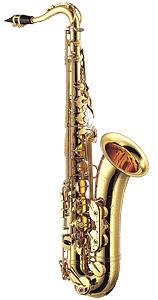 Saxophone Technique
Saxophone Technique Earl
Bostic
Earl
Bostic
 1. Low breath.
1. Low breath. 
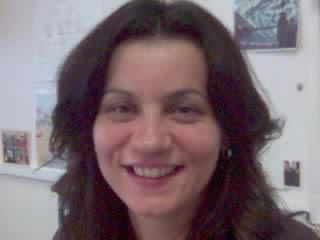
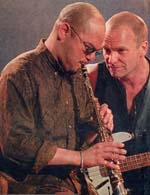

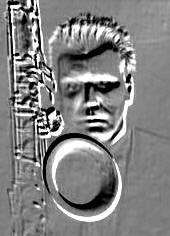
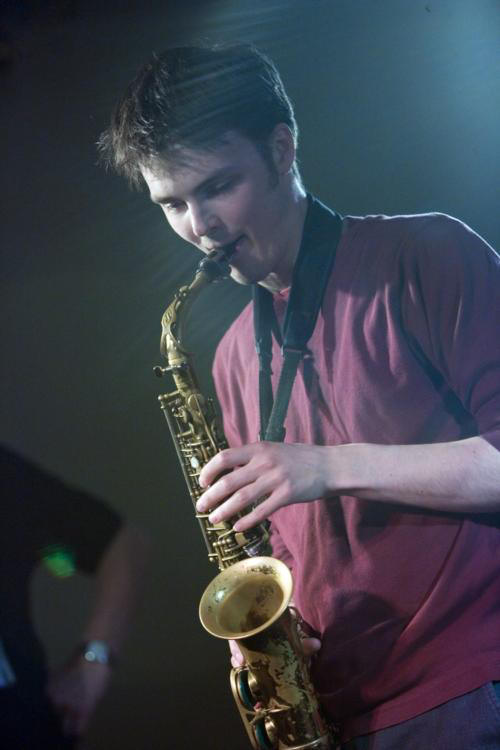 Paul
Towndrow Alto and Soprano
Saxophonist, Composer, Educator, As well as being a graduate of The National
Jazz Institute of Scotland and The University of Strathclyde, Paul studied for a
year at the world famous Berklee College of Music in Boston; USA having won an
international scholarship and went on to study with saxophone icons, George
Garzone and Joe Lovano. He currently leads his own group, The Paul Towndrow
Quartet, is a member of The Scottish National Jazz Orchestra and has also
performed with the Royal Scottish National Orchestra. In 2002 he won The Peter
Whittingham Jazz Award and secured Jazz Services touring grants for UK tours
with The Paul Towndrow Quartet in 2003, 2004 and 2006. In July 2003 he reached
the last four at The World Saxophone Competition at Montreux Jazz Festival and
won the Public Prize (most audience votes). He reached the final stages again in
2004 at the London Jazz Festival. On both occasions he was the only
representative of the UK to reach the finals. Paul was also selected to perform
at The Cheltenham International Jazz Festival in 2006. Paul recently toured with
sensational US group The Bad Plus, playing the music of Ornette Coleman. In 2004
he performed as part of a collaborative project with some of Norways top players
including drummer, Thomas Strønen and pianist Haavard Wilk, culminating in
performances at both Edinburgh and Oslo Jazz Festivals. He is a tutor and
clinician with Dumfries Youth Jazz Group. He has conducted masterclasses and
workshops at The Royal Scottish Academy of Music and Drama, Napier University,
Fife Youth Jazz Orchestra, Dumfries Youth Jazz Orchestra and Dumfries Junior
Jazz.
Paul
Towndrow Alto and Soprano
Saxophonist, Composer, Educator, As well as being a graduate of The National
Jazz Institute of Scotland and The University of Strathclyde, Paul studied for a
year at the world famous Berklee College of Music in Boston; USA having won an
international scholarship and went on to study with saxophone icons, George
Garzone and Joe Lovano. He currently leads his own group, The Paul Towndrow
Quartet, is a member of The Scottish National Jazz Orchestra and has also
performed with the Royal Scottish National Orchestra. In 2002 he won The Peter
Whittingham Jazz Award and secured Jazz Services touring grants for UK tours
with The Paul Towndrow Quartet in 2003, 2004 and 2006. In July 2003 he reached
the last four at The World Saxophone Competition at Montreux Jazz Festival and
won the Public Prize (most audience votes). He reached the final stages again in
2004 at the London Jazz Festival. On both occasions he was the only
representative of the UK to reach the finals. Paul was also selected to perform
at The Cheltenham International Jazz Festival in 2006. Paul recently toured with
sensational US group The Bad Plus, playing the music of Ornette Coleman. In 2004
he performed as part of a collaborative project with some of Norways top players
including drummer, Thomas Strønen and pianist Haavard Wilk, culminating in
performances at both Edinburgh and Oslo Jazz Festivals. He is a tutor and
clinician with Dumfries Youth Jazz Group. He has conducted masterclasses and
workshops at The Royal Scottish Academy of Music and Drama, Napier University,
Fife Youth Jazz Orchestra, Dumfries Youth Jazz Orchestra and Dumfries Junior
Jazz. 

 Local Tuition - Tim Wilson.
an experienced player and teaches saxophone and flute (all levels). I also teach
jazz improvisation. Tel: 01993 704441
Local Tuition - Tim Wilson.
an experienced player and teaches saxophone and flute (all levels). I also teach
jazz improvisation. Tel: 01993 704441